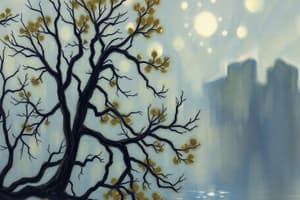Podcast
Questions and Answers
What is the first step in the experimental design process?
What is the first step in the experimental design process?
- Define variables (correct)
- Formulate a hypothesis
- Measure the dependent variable
- Design an experiment
What distinguishes the independent variable from the dependent variable in an experiment?
What distinguishes the independent variable from the dependent variable in an experiment?
- The dependent variable is manipulated while the independent variable is measured
- The independent variable is the outcome while the dependent variable is unchanged
- The dependent variable is the variable that remains constant throughout the experiment
- The independent variable is changed by the experimenter, while the dependent variable is affected by that change (correct)
In an experiment testing the effects of light color on plant growth, which group represents a control group?
In an experiment testing the effects of light color on plant growth, which group represents a control group?
- Plants exposed to red light
- Plants exposed to normal sunlight (correct)
- Plants exposed to green light
- Plants exposed to blue light
What is the purpose of formulating a hypothesis in an experiment?
What is the purpose of formulating a hypothesis in an experiment?
Which of the following accurately describes random assignment in experimental design?
Which of the following accurately describes random assignment in experimental design?
What type of data is primarily collected during an experiment?
What type of data is primarily collected during an experiment?
How should the dependent variable be measured in an experiment?
How should the dependent variable be measured in an experiment?
What is the main purpose of experimental design?
What is the main purpose of experimental design?
Which of the following describes the independent variable in an experiment?
Which of the following describes the independent variable in an experiment?
What is the difference between scientific theory and scientific law?
What is the difference between scientific theory and scientific law?
To ensure a good experiment is designed, what aspect is essential to have?
To ensure a good experiment is designed, what aspect is essential to have?
How do accuracy and precision differ in an experimental context?
How do accuracy and precision differ in an experimental context?
What role does the scientific method play in experiments?
What role does the scientific method play in experiments?
Which of the following statements about scientific laws is true?
Which of the following statements about scientific laws is true?
In the context of experimental design, what is the dependent variable?
In the context of experimental design, what is the dependent variable?
Flashcards are hidden until you start studying
Study Notes
Experimental Design
-
Purpose: To create controlled conditions for an experiment to limit outside interference and form a conclusion based on a hypothesis.
-
Outcome: Provides evidence to support scientific law and theory.
-
Scientific Theory: Explains why things occur the way they do after repeated experiments.
-
Scientific Law: Describes a pattern, often represented by an equation.
-
Process:
-
Define Variables:
- Independent Variable: The experimenter manipulates this variable (e.g., color of light in a plant growth study).
- Dependent Variable: Changes due to the independent variable (e.g., plant growth).
- Control Variable: Kept constant throughout the experiment.
-
Formulate a Hypothesis: An educated guess about the experiment's outcome.
-
Design an Experiment: Set up the experiment with treatment and control groups.
-
Assign Subjects:
- Random Selection: Choosing a population for the experiment.
- Random Assignment: Randomly assigning subjects to either the treatment or control group.
-
Measure the Dependent Variable: Collect data (qualitative or quantitative) to assess the dependent variable's change.
-
What Makes a Good Experiment?
-
Knowledge: Have background knowledge in the area of study.
-
Equipment: Use accurate and precise equipment.
- Accuracy: How close collected values are to the true value.
- Precision: How close measurements are to each other.
-
Thoroughness: Conduct experiments with meticulous detail for reproducibility.
-
Scientific Method: A standard process for recording experimental processes, allowing others to repeat and verify results.
Example of an Experimental Investigation
- Pharmaceutical Company
- Investigated: Effectiveness of new medication for a specific disease.
- Methods:
- Treatment Group: Received the medication.
- Placebo Group: Received a pill with no medication.
- Results: Data confirmed positive results for the treatment group; the placebo group showed no improvement.
Studying That Suits You
Use AI to generate personalized quizzes and flashcards to suit your learning preferences.




